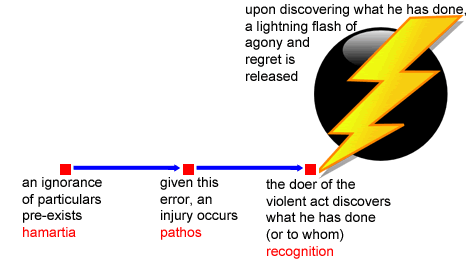
4) ignorance of principles / ignorance of particulars
In the legal terminology of the Ethics, Aristotle differentiates between injuries brought about as a result of an ignorance of principles and those caused by an ignorance of particulars. Violent acts stemming from an ignorance of principles are called unjust acts (ἀδικήματα), and they are not to be forgiven by the courts. Acts stemming from an ignorance of particulars, on the other hand, are referred to as mistakes (ἁμαρτήματα), and carry with the possibility of forgiveness. If, upon discovering that the man he had killed at the crossroads was his father, Oedipus had asked, "so, what's wrong with killing my father? … ," his ignorance would not have served as an acceptable defense. As in contemporary courts, such ignorance is no excuse. However, if he was to cry out in agony, "Oh,oh! All brought to pass, all true... ," we might conclude that he knew it was wrong to kill one's father, but did not recognize the man as his father. In fact, what he did was precisely what he hoped to avoid. The pain and regret that he expresses upon discovery of his mistake, meets Aristotle's criterion for understanding that the ignorance involved was one particulars rather than principles. Our pity for Oedipus stems from the feeling that had we been in his situation – had we been raised since birth in Corinth by Merope and Polybus - we might have reacted as Oedipus did at the crossroads when he was struck in the head by the stranger he encountered there.


